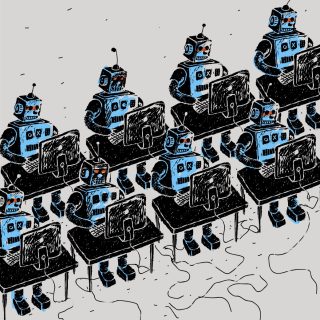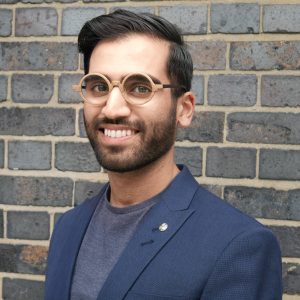 Hannan Hashmi is a final year LLB student at City and has been on an exciting journey in the past year, developing a contract analytics platform to market to legal professionals.
Hannan Hashmi is a final year LLB student at City and has been on an exciting journey in the past year, developing a contract analytics platform to market to legal professionals.
Hannan came along to the final of the university’s business ideas competition, CitySpark, in March 2016 as an observer, and was so impressed with the pitches he saw, he was determined to come up with an innovation of his own. He had a rudimentary understanding of coding and used this for a HackCity event run at City in March 2017, by developing an app which suggested restaurant options based on the user’s dietary requirements. His app won him first prize in the ‘No user interface’ category.
Some interning at law firms followed, where he saw much evidence of repetition around regular tasks and was shocked no-one was concerned by this waste of time, or indeed thinking of ways in which this might be tackled. Hannan lapped up books by Joanna Goodman (Robots in Law: How AI is Transforming Legal Services (Ark Publishing 2016) and Richard Susskind (Tomorrow’s Lawyers (2nd edn, OUP 2016) amongst others) around the potential uses of artificial intelligence (AI) within legal practice. He began thinking seriously about streamlining some of the tasks around contracts within firms.
Next came the pitching his idea to the City Foundership Programme, which if successful (spoiler alert: it was!) would mean the provision of an office space and support network to help him develop his idea: an artificial intelligence powered contract analytics platform. He also gained the support of the team at City Launch Lab who suggested he enter the annual Made@City competition. This event showcases the best student project work across City involving creativity, technology and design with exhibition guests voting for their favourite projects.
What was it like to exhibit your innovation to so many people?
I arrived later than planned and only just had time to set up rather than look around at the other exhibitors, but what I saw was a bionic arm, an F1 car and virtual reality games…how could I stand out with just my laptop and a bunch of papers? My plan was to get those visiting my stand to carry out a contract review task – asking them to review the clause in a contract and pick out certain key terms. Each person was timed and also a record made of the number of key terms located, before I demonstrated how quickly the tool I had developed could do the same task and with much greater accuracy.
So what is Codify Law?
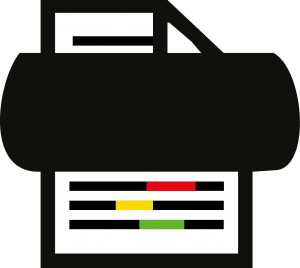 Codify Law is a tool that leverages AI to perform a first-pass of contracts for legal professionals, with the aim of 10xing their output. I created this tool during my degree course as a way to improve the sometimes lengthy legal process I encountered during summer vacation schemes.
Codify Law is a tool that leverages AI to perform a first-pass of contracts for legal professionals, with the aim of 10xing their output. I created this tool during my degree course as a way to improve the sometimes lengthy legal process I encountered during summer vacation schemes.
The tool works by using deep neural networks to find and highlight key points of contention in legal contracts that do not align with an organisation’s predefined objectives. These highlighted points are then categorised according to priority and impact.
In parallel, a score is calculated giving a birds-eye-view of the contract’s overall favourability.
Where did the idea come from?
As I mentioned earlier, my internships within law firms really highlighted how much very basic work was being done over and over again. This was reinforced when I read the Deloitte report (Developing legal talent: Stepping into the future law firm – Feb 2016) which predicted that 39% of legal jobs will be automated by 2026 (114,000 jobs!). It really is an archaic industry – prime for innovation, particularly around automation.
I began making a conscious effort to split my time, spending 40% of it earning money (to pay my rent!) and 60% dedicated to my development of Codify Law. I work in Business Development in an Architectural Design Agency which has taught me how to be adaptive and gives me a real insight into how small businesses operate.
How have you developed expertise in analytics and AI?
 I’ve always enjoyed understanding how things work and this has never been limited to a specific field. Around the age of 14 I really got into coding and editing the code of video games. It was fascinating to see how worked, and also how tweaking the code in a very small way could make a massive difference to how the game functioned. Prior to law I studied pre-clinical medicine for a short period but it wasn’t for me, I looked for a different sector where I could make an impact on multiple businesses. Law ticked that box for me.
I’ve always enjoyed understanding how things work and this has never been limited to a specific field. Around the age of 14 I really got into coding and editing the code of video games. It was fascinating to see how worked, and also how tweaking the code in a very small way could make a massive difference to how the game functioned. Prior to law I studied pre-clinical medicine for a short period but it wasn’t for me, I looked for a different sector where I could make an impact on multiple businesses. Law ticked that box for me.
What’s exciting is that we are at the stage where everything you need to learn anything is out there for free online. The next Einstein might be from a third-world country (as long as they have access to the internet); we all have the ability to achieve what we want with such ready access to knowledge.
I learned my skills trawling through YouTube and by taking MOOCs on the topic of AI. Remember the very first MOOC (Massive Open Online Course) was what kick-started Coursera (the leading provider of online courses).
What are you going to do with your prize money?
It will be ploughed into the business – much of legal business is relationship driven so I need to commit funds to getting out there and meeting people, networking. I’ll be attending legal conferences, marketing Codify Law and also presenting at the Legal Geek conference in Shoreditch in October. The rest of my funds will be go towards product development; I need to work with legal professionals to gain a deeper understanding of workflow.
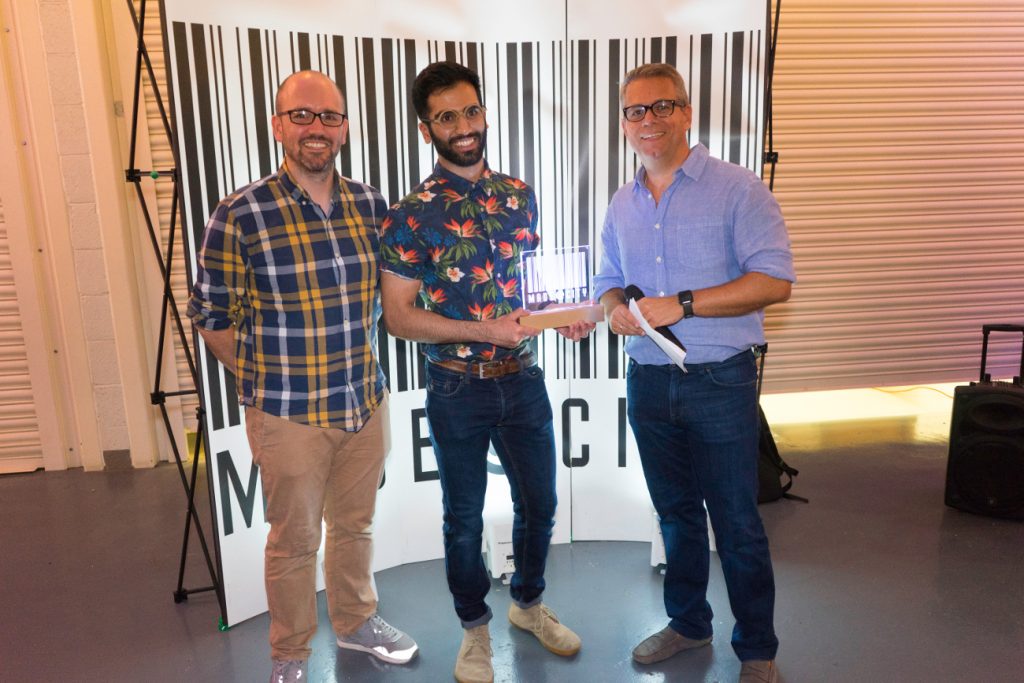
There has been a lot said about the new roles for lawyers of the future, hybrid roles that don’t exist yet (Susskind talks of legal knowledge engineers, designers, process analysts…), we saw the Online Courts Hackathon in July, where do you see yourself in a few years’ time?
There is indeed massive potential for automation within the legal industry and I want to be one of those players. Excitingly some of that knowledge can be easily transferred to other industries, for example healthcare, so once Codify Law is refined I’ll be looking to diversify to other fields.
I see myself as a Legal engineer – essentially someone with a legal background who gets into coding: the marriage of law and technology.
It was great to read about the teams of differently skilled individuals working together to create solutions for the challenges prompted around the online courts proposal.
How important is it for law students to develop an interest in diverse fields traditionally seen as ‘outside’ the law? Do you have any tips for students keen to get involved in technology related projects?
Law students have a lot on their plate, keeping up with the reading as well as all the extra pressure in terms of securing vacation schemes, mini pupillages, getting involved in pro bono and mooting. However it is important not to pour all of yourself into your studies, reserve some energy into keeping up to date on developments within the legal industry and connected businesses – this commercial awareness is vital. You need to know how world is changing around you! Take the time to read around, find something interesting but broken. See a flaw and find a solution.
Do you have any tips for anyone reading this with an interest in innovation and development?
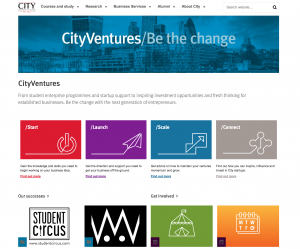 Read the Joanna Goodman book Robots & Law, it’s an excellent primer. Also the CityVentures website is a brilliant resource – so many interesting events to attend, speakers to listen to and opportunities available. I didn’t realise this until quite late on. The CityStarters Weekend is brilliant.
Read the Joanna Goodman book Robots & Law, it’s an excellent primer. Also the CityVentures website is a brilliant resource – so many interesting events to attend, speakers to listen to and opportunities available. I didn’t realise this until quite late on. The CityStarters Weekend is brilliant.
In law/tech specific terms – there is a LawTech London meetup group, which offers a fantastic platform for you to learn about ideas, listen to interesting panel discussions. Also the LegalGeek conference I mentioned earlier is well worth keeping an eye on – you need to pay for entry (£80-£125), but if you are a start-up you can apply for a presentation spot, and if successful, your entry will be free. Listening in to the Tim Ferriss Show (podcast) is also a top recommendation.
Quick-fire questions
Holiday this year? A break in Bournemouth for a friend’s stag party. No alcohol (unusual I know!) but lots of full-on activities (rock-climbing, football, running) and great food.
Best legal drama? Suits
Favourite place in area local to City Boxpark Shoreditch – really enjoy Cook Daily.
Most-used app – Podcast Addict
Many thanks to Hannan for coming along to talk to us, you can find out all about Codify Law via the website and get in touch with Hannan via LinkedIn.

